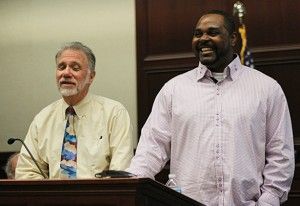Freed man shares experience with Illinois Innocence Project

April 6, 2013
Fourteen years, three months and 11 days. That’s the amount of time one Chicago man spent in prison.
Even though he was released from prison more than five months ago, he didn’t truly receive his freedom until Friday when he received word his probationary ankle monitor could come off.
Advertisement
Anthony Murray’s story began on June 21, 1998, when a man named Seneca Jones was stabbed once in the heart during a dice game in Centralia. Murray, a Chicago native, was visiting one of Jones’ family members. Murray was all the way across town when the incident happened, he said, and there were several witnesses for his alibi.
Murray was arrested for Jones’ death a few hours after the incident, and he was convicted of first-degree murder nearly five months later on Nov. 19, 1998.
He received a new trial May 7, 1999, because one of Jones’ friends was on the first trial’s jury, and he was convicted of first-degree murder again. After the second conviction, Murray said he used his frustration to become proactive and take advantage of a program that could help prove his innocence.
Murray appealed to the Illinois Innocence Project and gained his freedom Oct. 31. He visited the university’s law school courtroom Friday to talk to students and guests about what the project has done for him.
The Innocence Project, which is located at the University of Illinois-Springfield, evaluates requests from inmates who claim innocence, said Erica Nichols Cook, Illinois Innocence Project staff attorney. Inmates must have more than four years left on their sentence and claim actual innocence or the case will be thrown out, she said.
Murray said Rhonda Keech, Illinois Innocence Project case coordinator, decided to look at his transcripts after he reached out to her. He said Keech asked him why he was still sitting in jail after examining the information, and he asked himself that question every night.
Larry Golden, Illinois Innocence Project founding director, said Marion county states attorney Matthew Wilzbach worked with Murray and the project but decided he did not have enough evidence to overturn his case a third time. However, he did not want to dismiss his case.
Advertisement*
Murray said he was offered an Alford plea, which granted him freedom from prison but convicted him of second-degree murder. In return for the deal, Murray was released.
While Murray is not confined to a prison cell anymore, he still holds the label of a convicted felon. He had to wear an ankle bracelet while he was on parole and could only leave his house from 9 a.m. to 4 p.m. Tuesdays through Fridays, Golden said.
Murray also needed permission to travel and speak at locations on behalf of the project. Golden said Murray went from being in prison, to freedom, back to prison, essentially, because of the ankle monitor.
He said he will continue his job search and go back to school now that he is finally free from mandatory supervision. He said he is still trying to catch up with technology, learn how to use cell phones and computers and he has no idea how to use the Xbox 360 or Playstation 3.
Murray said he looks forward to spending more time with his family because it is important to him since he missed 13 family members’ funerals and three grandchildren’s births.
He said several roadblocks lay ahead of him, but he will live his life with optimism.
“If McDonald’s won’t hire me, maybe Burger King will,” he said.
Golden said there is an estimated twomillion Illinois inmates, and there would be 20,000 innocent inmates if just 1 percent were innocent.
Brad Rau, a second-year law student from Sullivan, said the Illinois Innocence Project can give inmates a second chance.
“Sometimes the system fails,” he said. “It’s a terrible thing when it does. That’s why the Innocence Project is so important.”
Advertisement








